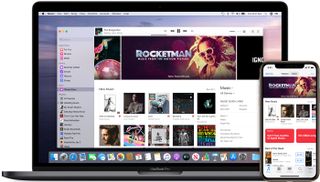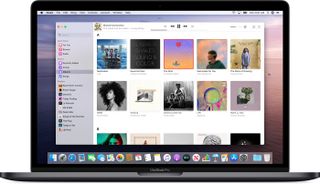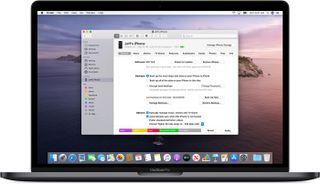iTunes shutting down: when and why it’s happening
It isn't totally disappearing – but big changes are coming

First launched in 2001, Apple's iTunes is one of the most widely-used pieces of software ever made – and one of the most divisive, too.
As useful as the music and media management tool has been over the years, especially to those of us with iPods, iPhones, and iPads, it has also morphed, expanded, and evolved to be a bloated and confusing bit of legacy software.
Now all of that is changing. At WWDC 2019, Apple announced that it will soon shut down iTunes on Mac with its Fall 2019 update, replacing it instead with separate new Apple Music, Apple TV, and Apple Podcasts apps that will allow the company to better focus on each type of media.
But what about all of the music you've accumulated, and playlists you've artfully devised? What about people who still want to buy digital songs, rather than pay a monthly subscription fee? And perhaps most importantly, what about Windows PC users? Apple has put out a short FAQ to help, giving us answers to all of those questions now. Here's everything you need to know.
From one, many: iTunes to Apple Music, Podcasts, TV
Apple used WWDC this year to unveil the next big macOS update, macOS Catalina, and the event was preceded by stark headlines portending the inevitable death of iTunes. And they were right, to some extent.
It's true: on Macs, iTunes is indeed going away as a piece of software. The long-awaited iTunes shutdown is finally happening. As mentioned above, Apple will roll out separate Music, TV, and Podcasts apps that are specifically built to highlight and manage each type of media.
Apple Music, the company's all-you-can-listen subscription service, has become a significant driver of revenue in recent years as people turn away from buying individual albums and tracks. The iTunes Store surely still has some ardent users who want to "own" their music, but those numbers are significantly dwindling. The melding of classic iTunes and Apple Music has never been the most harmonious pairing, so this refocusing makes sense.
Get daily insight, inspiration and deals in your inbox
Get the hottest deals available in your inbox plus news, reviews, opinion, analysis and more from the TechRadar team.
Likewise, as digital video has become a much larger part of the entertainment ecosystem, it's helped make iTunes a bloated, awkward-to-navigate affair. With Apple launching its own Apple TV Plus streaming service this year with original TV shows and movies, trying to cram that into the existing iTunes experience could've been a mess. Instead, Apple is releasing a dedicated TV app with macOS Catalina.
And as podcasts continue to grow in popularity, it didn't make sense to keep trying to include that as a listening pillar alongside Apple Music and the iTunes Store within a single app. The Podcasts app will get its own dedicated experience for fans to use on their Macs.

How will it happen?
Essentially, iTunes is splitting up its responsibilities amongst three children apps, and they'll continue on its legacy in a hopefully easier-to-use fashion. And Apple, the "it just works" company, seems intent on making sure that this transition causes no undue burden on Mac users as they get used to shifting to new kinds of media apps.
Apple has published a support document that answers many of the lingering questions from the WWDC reveal, including what each app will do and how your existing iTunes content will be handled by those new apps. Unsurprisingly, just about everything should happen automatically.
Music that you have imported into iTunes or purchased from the store will automatically be available via the Apple Music app. That also applies to playlists and smart playlists, so you don't have to worry about your "Workout Jamz" or "Best Summer EVER" playlists going anyway. They'll still be as amazing as ever within Apple Music.
Surprisingly, the iTunes Store itself isn't going away: it will simply be a tab within the Apple Music app on Mac. If you subscribe to the Apple Music service, you can even hide the iTunes Store listing, just for simplicity's sake. Meanwhile, the iOS and Apple TV versions of the iTunes Store will remain exactly as they are today.
Podcasts from iTunes, expectedly, will be automatically transferred into the new Podcasts app, along with your subscriptions. Audiobooks will be sent to the updated Apple Books app on Mac, however, and you'll use that app to purchase any further audiobooks in the future.
Movies and TV shows that you bought or rented from iTunes will automatically show up in the Apple TV app, then, which you'll use for future purchases and rentals. And when the new Apple TV subscription service is live, it'll coexist in there with your purchases, just like Apple Music will with iTunes Store purchases.
Got account credit in iTunes? Don't worry, it'll transfer over. Same for any iTunes Gift Cards you have laying around right now—you don't need to hurry to redeem those right away. You can still use them with the new apps and the App Store.
Lastly, iPhone, iPad, and iPad backups, syncing, and restoration will be done via Finder on Mac. That's just about everything then, right?

What about iTunes on Windows PCs?
Good question! While Apple is obviously most concerned with pushing the latest and greatest software to its own hardware, iTunes has a huge contingent of users on Windows PC. Many of those probably got hooked in via an iPod, iPhone, or iPad, while others may subscribe to Apple Music. But really, regardless of whether they're still spending money in Apple's ecosystem, they need to be kept happy.
Here's the good and bad news: nothing is changing for PC users. That's good news because the existing iTunes will stay exactly how it is, which means there's no need to get used to new software, and no reason to worry that the transition will go less smoothly than Apple intends.
The bad news, of course, comes from all of those little complaints that we referenced above. While iTunes is functional enough these days, it has become big and messy over the years. Cramming the new Apple TV subscription service into there is surely doable, much as Apple did with Apple Music, but it's not going to make iTunes seem any cleaner or easier to navigate.
But that's the reality of the situation for now, at least. Perhaps Apple will roll out the separate apps in the future or otherwise streamline or rework iTunes for the PC audience. We have to think that it's probably not a huge priority in the grand scheme of things, though. Besides, if Macs have the better Apple entertainment software onboard, it's just another potential reason to compel PC owners to switch.
All Mac users with compatible devices will see the big changes sometime around September or October when macOS Catalina rolls out, but those who don't mind playing with pre-release software can get a crack at it sooner: Apple released a developers' build of macOS Catalina following the WWDC keynote, and everyone else can register and download the public beta when it rolls out sometime in July.
- macOS Catalina vs Windows 10: which is the better OS?
Most Popular



